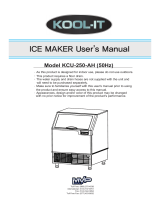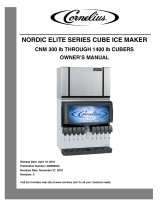
ELEVATION SERIES INSTALLATION GUIDELINES
2
For proper operation of the ice machine, the
following installation guidelines must be followed
by a qualified refrigeration technician. Failure to
do so may result in loss of production capacity,
premature part failures, and may void all
warranties.
Reference the installation parameters prior to
installing the machine. Ice-O-Matic assumes no
responsibility for improperly installed equipment.
Excessive time required for service or time for
units requiring removal for service of inaccessible
equipment will be the sole responsibility of the
equipment owner.
This appliance is not to be used by persons
(including children) with reduced physical, sensory
or mental capabilities, or lack of experience and
knowledge, unless they have been given
supervision or instruction. Children shall be
supervised and are not to play with the appliance.
Do not store explosive substances such as aerosol
cans with flammable propellants in this device.
Ambient Operating Temperature
Minimum operating temperature:
50°F (10°C)
Maximum operating temperature:
100°F (38°C) (60 Hz.), 110°F (43°C) (50 Hz.).
Note: Ice-O-Matic ice-makers and dispensers are not
approved for outdoor installation
Incoming Water Supply
WARNING: Connect to unheated potable water
supply only
(see Electrical and Plumbing diagrams for line sizing)
Minimum incoming water temperature:
40°F (4.5°C)
Maximum incoming water temperature:
100°F (38°C)
Minimum incoming water pressure:
20 psi (1.4 bar, 0.138MPa)
Maximum incoming water pressure:
80 psi (5.5 bar, 0.552MPa)
Note: if water pressure exceeds 80 psi (5.5 bar), a water
pressure regulator must be installed
All water supply lines must be installed per local
codes. Use 3/8 inch O.D. minimum on air cooled
machines. On water cooled machines 3/8 inch O.D.
minimum tubing must be run to the condenser. The
water supply for the machine can “T” off from the
condenser line using 3/8 inch O.D. minimum
tubing. Make 2 coils of extra tubing so that the
machine can be pulled away from the wall if
service is needed.
Water Filtration/Treatment
A water filter system should be installed with the
ice machine. Refer to Ice-O-Matic water filter
specification sheet. Ice-O-Matic is not responsible
for the impact of poor water quality on the
performance of the ice maker. In extreme cases,
solutions such as Reverse Osmosis or De-
ionization may be necessary to achieve proper ice
formation.
Reverse Osmosis (RO) water can be very acidic and
can attack the evaporator and other metal in the ice
machine. Because the RO process removes all
minerals and metals from the water it can promote the
faster growth of microbial mold and slime. If RO
water is used, Ice-O-Matic recommends the water pH
is verified to be a neutral 7.0 to minimize the
corrosive effects. Incorrect cleaners, sanitizers, and
RO water that does not have a neutral pH could void
the machine’s warranty.
Drains
All drain lines must be installed per local codes.
Flexible tubing is not recommended. Route bin
drain, purge drain and water condenser drain
individually to a floor drain. The use of condensate
pumps for draining water is not recommended.
Ice-O-Matic assumes no responsibility for
improperly installed equipment.
Note: The purge drain fitting is plastic: DO
NOT apply heat to purge drain area; DO NOT
over-tighten drain connection
Installation Guidelines
























